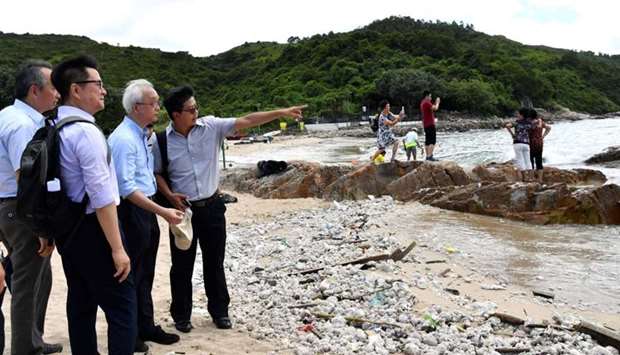Their efforts came as the government said around 1,000 tonnes of the solidified oil had spilled from a cargo ship after a collision with another vessel near the Pearl River estuary in southern China Thursday.
It was the first time authorities had confirmed how much had been spilled.
Around 200 tonnes is likely to reach Hong Kong's shores, deputy environment chief Tse Chin-wan told reporters.
Thirteen of the city's most popular swimming spots are closed after white clumps of the oil started appearing Sunday.
Official cleaning teams have been sent to clear it from beaches and surrounding waters.
But criticism of the government's response is mounting.
On Wednesday afternoon a team of local volunteers from Lamma Island in the south of Hong Kong braved sweltering heat and humidity to comb one of the worst-affected beaches, filling black bin bags with the lumps of oil.
A sour stench hung over the area and small numbers of dead fish were washing in.
The surrounding pathways were slippery with oil that had melted as temperatures hit 33 degrees Celsius (91 degrees Fahrenheit).
"The government should put in more effort to clean up. I'm here because no one else is doing it," Tony Mok, 31, told AFP.
"Every morning it looks like it has snowed in Hong Kong, and every afternoon it's all melted back down under the sand," said Lamma resident Robert Lockyer, who was leading the two dozen volunteers working to remove the oily white clumps.
Aleli Pena, 38, described the clean-up effort as "hard, hot and disgusting".
"We're all volunteers -- where are you government?" she asked.
Too little, too late?
Environment campaigner Gary Stokes said the government should have installed pollution booms -- a kind of floating barrier -- to stop the oil reaching the beaches.
Stokes, Asia Director for Sea Shepherd Conservation Society, has written to the marine department asking them to install the booms to guard against more oil washing in.
Tse had said earlier that he would not rule out the oil spreading to other areas.
The government has repeatedly described the palm oil as non-toxic and "harmless" to humans.
"You will see that many instant noodles have palm oil in them," Tse said Wednesday, although he acknowledged a large amount would affect the environment.
Stokes said the oil was hazardous to wildlife because it attracts bacteria and had left a greasy film on the water which would reduce the supply of oxygen.
After examining the waters by boat himself, he told AFP the fish were "going crazy" for the lumps of oil and eating it, with unknown consequences.
The government has been questioned over why it was not notified by mainland authorities until Saturday of the Thursday spill.
Tse said it was only then that Chinese authorities realised it would spread to "other regions".
The marine department then dispatched ships to try to recover some of the oil, he said.
So far 50 tonnes had been gathered in Hong Kong and 38 tonnes in Guangdong, Tse added.

